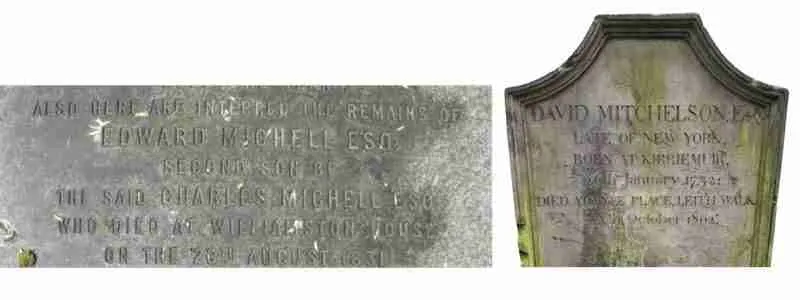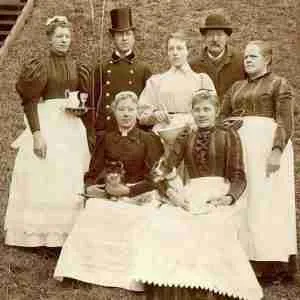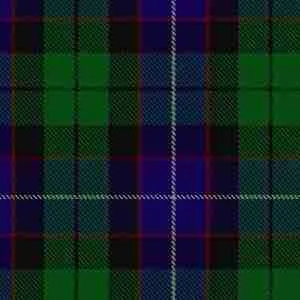Is the Mitchell surname Scottish? Well the simple answer is YES!
As part of my series on Scottish surnames, I decided to look into this family name. Although it is Scottish, this last name came from overseas over 900 years ago.
Origins of the last name Mitchell
The Mitchell surname has two distinct roots. Firstly, it is a popular form of the first name Michael, which arrived in Britain as the softened French form of Michelle. The Scots, known for their unique pronunciation, adapted it to Mitchell, both as a first name and later as a surname. Even today, Michael is pronounced as Mitchell in parts of Orkney.
Secondly, the other derivation comes from the nickname for a man of large build, from the Old English word mycel, meaning big.
Nevertheless, it is a common surname in Scotland and can be found in Scottish records dating back to the 14th century. For example, John Michelsone was granted a safe conduct to trade in England in 1395. Nearly 50 years later, Robert Michael de Hyrmanston was a charter witness in 1438 while John Mitsell owned land in Glasgow in 1496.
The meaning of the Mitchell surname
The last name Mitchell has the same meaning as the surname Michie, a Scottish surname that I recently wrote about.
Mitchell comes from the given name Michael, to mean ‘who is like God’ in Hebrew.
The history of the Mitchell surname
The Mitchell surname was first found in Surrey, England. However, it is believed to have migrated north from Durham or Yorkshire around 1130. During the reign of King David of Scotland, who ascended to the throne in 1124, many families, including the Mitchells, were invited to Scotland.
King David wanted to strengthen Scotland. He did so by inviting settlers to join the military service in exchange for land, or to settle in burghs to help stimulate trade.
The Mitchell clan
The Mitchell surname is not associated with a clan in the traditional sense within Scottish Highland clan structure. However, it is a sept of the Innes Clan whose motto is Be Faithful. Septs are normally linked to a clan through historical alliances, geographical proximity, or family connections.
The Mitchell tartan
The Mitchell tartan is shared by Hunter, Galbraith, and Russel. It is predominantly green and blue with white and red lines.
Variations of the Mitchell surname
Mitchelson and Michie are variations found in certain parts of Scotland. For example, the Michie surname is mostly found in the north-east. There are other variations such as Michell, Michel, Mitsell, Mitchellson, Mitchellsone, Mikle and Meickle.

Interestingly, the name or word ‘meikle’ means large in Old Scots – a reminder of the Old English word mycel. In Scotland, you can find farms with the name Meikle such as ‘Meikle Seggie’ near Milnathort, Kinross-shire.
Are there any famous Mitchells?
Yes there are. People with the Mitchell surname have made significant contributions in fields literature, exploration, and sports, to name a few:
- Margaret Mitchell (1900 – 1949)- she was an American novelist best known for her novel “Gone with the Wind,” published in 1936. She won the Pulitzer Prize for Fiction in 1937 and you know what happened next? … the novel was later adapted into one of the most iconic films.
- Joni Mitchell (born 1943) – she is a Canadian singer-songwriter. She is celebrated for her folk music albums including “Blue,” “Court and Spark,” and “Hejira.”
- William Henry Metcalf Mitchell (1894 – 1968) – he was a Scottish recipient of the Victoria Cross during World War I for his actions on 25 September 1915 at the Battle of Loos, France. As a Lance Corporal in the 1st Battalion of the Scots Guards, he displayed bravery by rescuing a wounded comrade under heavy fire.
- Sir Thomas Livingstone Mitchell (1792 – 1855) – he was a Scottish-born surveyor and explorer who made significant contributions to the mapping of Australia in the 19th century.
- Of course, if you are British, you will be familiar with Phil Mitchell from Eastenders!
Although the Mitchell surname does not originally come from Scotland, its Scottish roots date back centuries. From its earliest mentions in historical records to its prevalence in today’s society, the Mitchell surname remains a notable part of Scottish heritage.
Let me know in the comments below if you want me to write about a particular Scottish surname.
Good luck with your research.
Until my next post, haste ye back.
You may also like...

Life of Victorian Servants: A Glimpse into the Past
Victorian servants belonged to one of the largest employment sectors in Britain. Did your ancestor work in this sector?

Scottish Genealogist, Sarah Smith, becomes ASGRA Council Member
Scottish genealogist, Sarah Smith, has just been elected as an ASGRA council member, Scotland’s only accredited association for genealogists.

The Urie Surname – Origins, Meaning & History
The Urie surname has geographical roots in Kincardineshire, a region near Aberdeenshire, and it is historically connected to Urie Castle.


Hi Sarah,
How interesting reading about the Mitchell families in Scotland, of whom I am a descendant. One of my other Scottish names that I find interesting is Annand, my 3rd great-grandmother’s surname. She was born in Inverurie, Aberdeenshire in 1808. I would love to know the origins of that name, and even if it IS Scottish!
Kind regards,
Michelle Copcutt
Hello Michelle
Thanks for your comment. I would be happy to write about your ancestral surname, Annand. It has piqued my interest so I will research it and write about it in my next blog towards the end of this month.
Thanks and watch this space 🙂
Sarah
hello Michelle
I have just published my blog post on the Annand/Annan surname. Thanks for getting in touch about it – it was fascinating researching this old Scottish surname.
thanks
Sarah
Hello. Trying to trace my McKnight ancestors. They migrated to America in 1772 on the ship Freemason, from Antrim, Ireland. My DNA shows I am 50% Scottish and I want to know more about my Scottish roots. Thank you for any leads you can provide.
Happy Hunting,
Terri Zammit
Hello Terri
Since your ancestors came from Antrim, Northern Ireland, it’s possible they were part of the Scottish migration to Ulster during the 1600/1700s, which might explain your Scottish DNA results. To research your Scottish heritage further, I’d recommend looking into records from both Scotland and Ulster, as well as connecting with other McKnight researchers. If you want, I could write a blog on the McKnight surname sometime in the future.
Best
Sarah
My name is James Douglas Mitchell. My ancestors emigrated from somewhere around New Deer to Canada in the mid-1830s. They were apparently members of the Free Church of Scotland and in fact started a Free Church in Winterbourne, Ontario, Canada. Members of the family in Ontario founded a number of Presbyterian churches. I am related to Burnetts and Gerries on the female side of the family. I assume that these people were farmers. I have had my ancestors traced through the records kept in Edinburgh and I have records of names back into the 1300’s. Any other information would be wonderful.
Hello James
That is amazing that you have been able to trace your family to the 1300s. Your ancestors’ occupations would have been noted after 1855 in the registers and sometimes before 1855. Militia records. census returns and tax records before 1855 may mention occupations as well. As for the Free Church, it was formed in 1843 but your ancestors may have belonged to a dissenting church in the mid 1830s. If there is anything specific you want me to research, then please get in touch.
Thanks
Sarah
Hi Sarah,
My Great Great Grandmother was a Mitchell and a mystery to me. She was from Donegal in Ireland c1825. She turned up in Yorkshire with a male child and no Husband. I am unable to find records of her birth Family. Rumour is that my Grandfather Joseph Mitchell was from a Gypsy beginnings. I am in Australia so how can I get more Information
Thanks
Rhonda
Hello Rhonda
Thanks for your comment. If they lived in Yorkshire, you could contact a local history society, for example there is the https://www.eylhs.org.uk/. they may be able to help you with information about travellers.
Also, this website here https://www.freebmd.org.uk/cgi/search.pl is good to locate registers in England although English statutory registers started in mid 1837.
I hope this was helpful. If not, get in touch by email: sarah@unlockyourpast.co.uk
thanks
Sarah